

Introducción. Game On – An Introduction to Roleplaying and Wargaming – ARTICLE : OneMetal.com. We all game, to a greater or lesser extent.
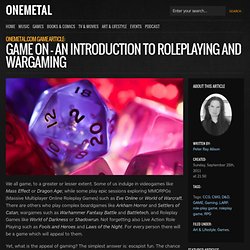
Some of us indulge in videogames like Mass Effect or Dragon Age; while some play epic sessions exploring MMORPGs (Massive Multiplayer Online Roleplay Games) such as Eve Online or World of Warcraft. There are others who play complex boardgames like Arkham Horror and Settlers of Catan, wargames such as Warhammer Fantasy Battle and Battletech, and Roleplay Games like World of Darkness or Shadowrun. Not forgetting also Live Action Role Playing such as Fools and Heroes and Laws of the Night. For every person there will be a game which will appeal to them. Yet, what is the appeal of gaming? Wargames I could make a glib comment about war and humanity, but that would be in poor taste. Roleplaying Tips. Quick links to article categories GMing Articles Over-Resting PCs How to handle a party that rests too much and is always healthy and buffed for every encounter.

Tips For Dealing With Stealthy PCs How to handle characters that cannot be seen or heard. Tips For Planning & Running The First Session Of A Campaign The first game session is always the most terrifying. Read this advice so it becomes a rollicking success. NPC Essentials Article & Book Info Create your best ever NPCs with this ultimate NPC resource. Good RPG Tips – Gamemaster Techniques for Role Playing Groups. I wanted to give my views on how to be a good gamemaster, because I’ve read a lot of bad advice online from writers whose players wouldn’t agree with their theories.
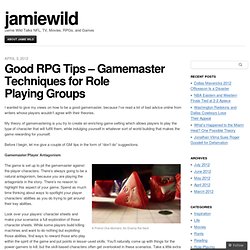
Introduction To Role-Playing (in Kim D&D) How to Get Started, Create an Awesome Character, and Have Serious Fun!
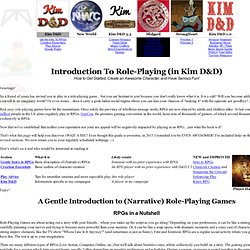
Gamemaster. A gamemaster (simplify as GM, also known as game master, game manager, game moderator or referee) is a person who acts as an organizer, officiant for questions regarding rules, arbitrator, and moderator for a multiplayer role-playing game.
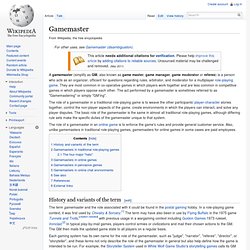
They are most common in co-operative games in which players work together and are less common in competitive games in which players oppose each other. The act performed by a gamemaster is sometimes referred to as "Gamemastering" or simply "GM'ing". The role of a gamemaster in a traditional role-playing game is to weave the other participants' player-character stories together, control the non-player aspects of the game, create environments in which the players can interact, and solve any player disputes.
The basic role of the gamemaster is the same in almost all traditional role-playing games, although differing rule sets make the specific duties of the gamemaster unique to that system. History and variants of the term[edit] The four major "hats"[edit] Productos y materiales necesarios. Nuestro Mundo. Worldbuilding. Worldbuilding or conworlding is the process of constructing an imaginary world, sometimes associated with a whole fictional universe.[1] The resulting world may be called a constructed world.

The term "worldbuilding" was popularized at science fiction writers' workshops in the 1970s. [citation needed] Developing an imaginary setting with coherent qualities such as a history, geography, and ecology is a key task for many science fiction or fantasy writers.[2] Worldbuilding often involves the creation of maps, a backstory, and people for the world. Constructed worlds can enrich the backstory and history of fictional works, and it is not uncommon for authors to revise their constructed worlds while completing its associated work. Campaign (role-playing games) See also campaign setting.
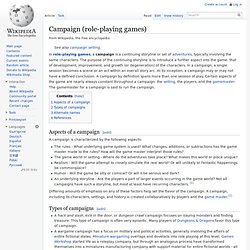
A campaign is characterized by the following aspects: The rules - What underlying game system is used? What changes, additions, or subtractions has the game master made to the rules? Campaign setting. Types of setting[edit] The use of the term "world" in describing a campaign setting is loose, at best.

List of campaign settings. This is a list of notable campaign settings published for role-playing games.

Several of the listed settings are literary and media settings for which RPG material has been produced under license. Fantasy[edit] Horror[edit] Adventure (role-playing games) A common component of the adventure are the often colorfully written blocks of descriptive text that are read out loud by the gamemaster to the players.
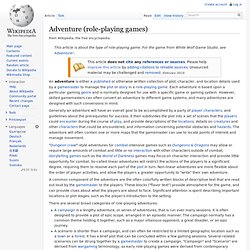
These blocks ("flavor text") provide atmosphere for the game, and can provide clues about what the players are about to face. Significant attention is spent describing important locations or plot stages, such as the player's introduction to the setting. Personajes. Character creation. Role-playing games[edit] The term character development is, in some contexts, used interchangeably with character advancement (in a sense similar to professional development or Human Development), whereas elsewhere character development refers instead to the player’s indirect characterization of the character through role-playing (in a sense similar to film developing).
Making decisions[edit] Characters can also gain a number of skills. What types of skills the characters can learn and how easily they can be learned usually depends on if the character creation system is “class based” or “skill based”. Character Attributes in Role-Playing Games. Character sheet. Lectura permanente (extensa) Role-playing game.
There are several forms of RPG. The original form, sometimes called the tabletop RPG, is conducted through discussion, whereas in live action role-playing games (LARP) players physically perform their characters' actions.[5] In both of these forms, an arranger called a game master (GM) usually decides on the rules and setting to be used and acts as referee, while each of the other players plays the role of a single character.[6] Several varieties of RPG also exist in electronic media, such as multi-player text-based MUDs and their graphics-based successors, massively multiplayer online role-playing games (MMORPGs). Role-playing games also include single-player offline role-playing video games in which players control a character or team who undertake quests, and may include capabilities that advance using statistical mechanics.
These games often share settings and rules with tabletop RPGs, but emphasize character advancement more than collaborative storytelling.[7][8] Role Play and Role-Playing Games: RPG. Role Play and Role-Playing Games: RPG : en Resources about role-playing games (RPG). Overview Analysis & Criticism. Suspension of disbelief. Suspension of disbelief or willing suspension of disbelief is a term coined in 1817 by the poet and aesthetic philosopher Samuel Taylor Coleridge, who suggested that if a writer could infuse a "human interest and a semblance of truth" into a fantastic tale, the reader would suspend judgement concerning the implausibility of the narrative.
Suspension of disbelief often applies to fictional works of the action, comedy, fantasy, and horror genres. Cognitive estrangement in fiction involves using a person's ignorance or lack of knowledge to promote suspension of disbelief. The phrase "suspension of disbelief" came to be used more loosely in the later 20th century, often used to imply that the burden was on the reader, rather than the writer, to achieve it. Role-playing game system. Basic Role-Playing. BRP is similar to other generic systems such as GURPS, Hero System or Savage Worlds in that it uses a simple resolution method which can be broadly applied, in this case an attempt to roll under a certain number with percentile dice. Each incarnation of the BRP rules has changed or added to the core ideas and mechanics, so that games are not identical. Modelos Teóricos. Role-playing game theory. GNS Theory. Strictly, GNS theory is concerned with players' social interactions, but it has been extrapolated to direct game design, both in and outside the world of RPGs.
Threefold Model. The Threefold Model or GDS theory of roleplaying games is an attempt to distinguish three different goals in roleplaying. In its original formation, these are: Drama, Simulation, and Game. It was the inspiration for subsequent theories, such as the GNS Theory and The Big Model, which retained a 3-way division but altered other aspects of the model. Role-playing game terms. Www. Newbie DM .com. Here’s what some folks are saying about rpgKids, the role playing game for kids that everyone’s talking about, featured on BoingBoing, Wired.com, and CNN.com! @knight777: My wife said “best family time we’ve had in a long time”@eljakod: my little guy is four and really loves the role playing aspects, gives him the chance to use his imagination in contextualized play@dreadgazebo: This is an awesome system you guys, I was given the honor of play testing this new system and it’s great.
Kids Dungeon Adventure - A Role Playing Game for Pre-Schoolers. Storytelling. Historical perspective[edit] A very fine par dated 1938 A.D. The epic of Pabuji is an oral epic in the Rajasthani language that tells of the deeds of the folk hero-deity Pabuji, who lived in the 14th century. Storytelling predates writing, with the earliest forms of storytelling usually oral combined with gestures and expressions. In addition to being part of religious ritual, rock art may[original research?] Storytelling game. Since this person usually sets the ground and setting for the story, he or she is often referred to as the "storyteller" (often contracted to "ST") or "narrator". Ejemplos. Spaceship Zero. Amber Diceless Roleplaying Game. List of role-playing games by genre.
Dungeons & Dragons. Universalis. Continuum (role-playing game)